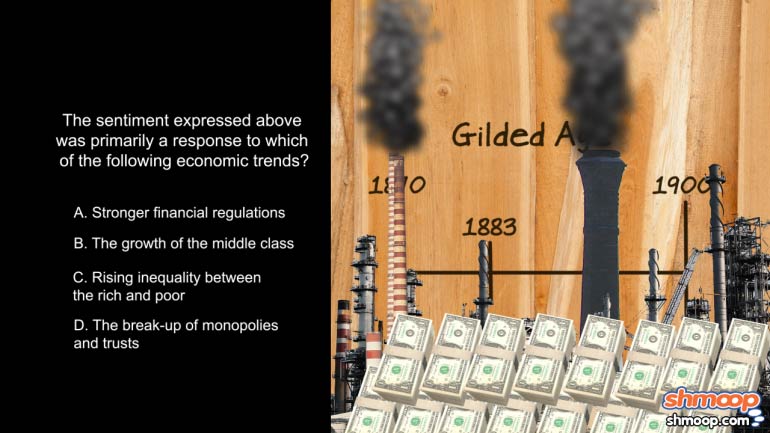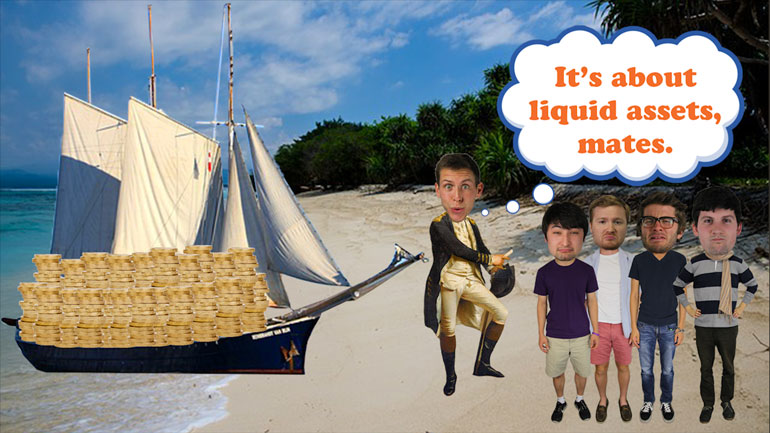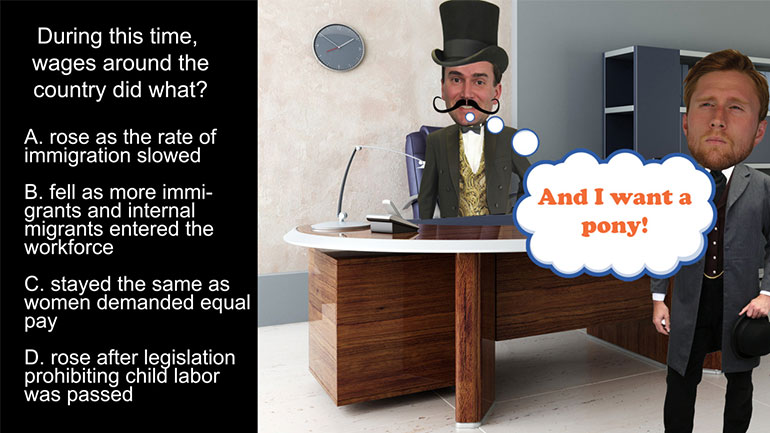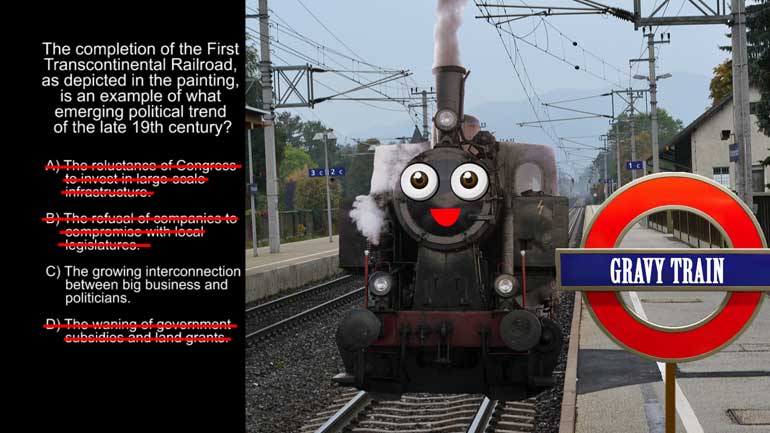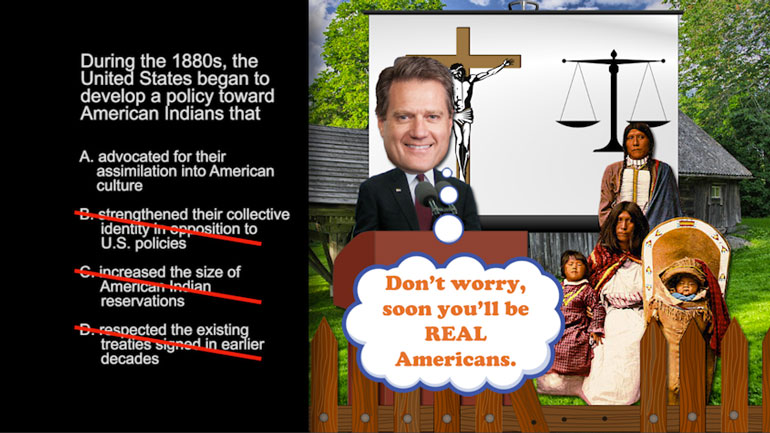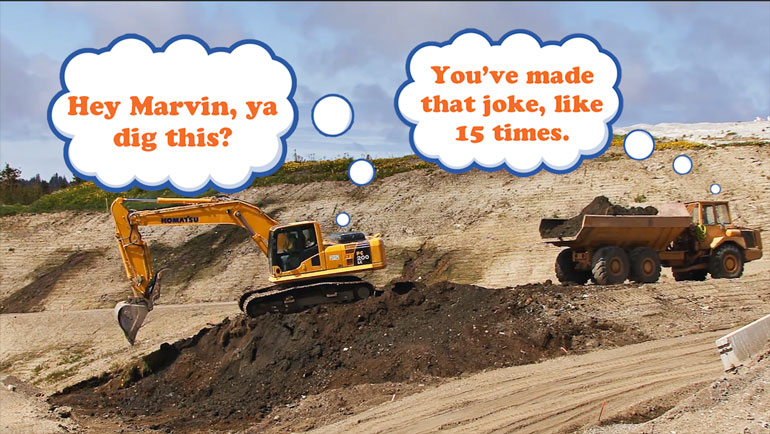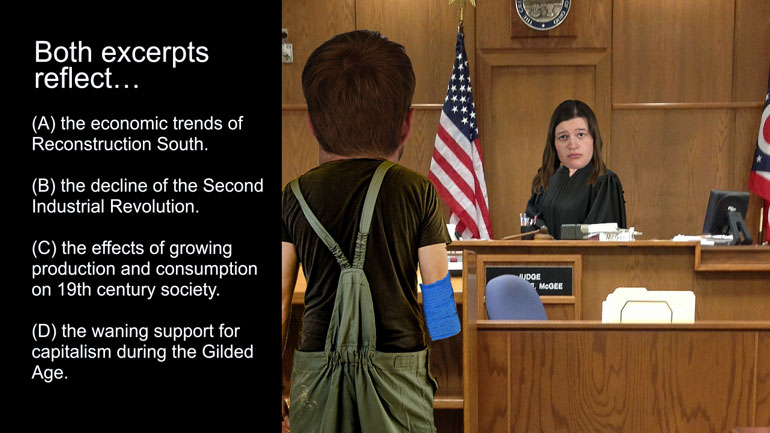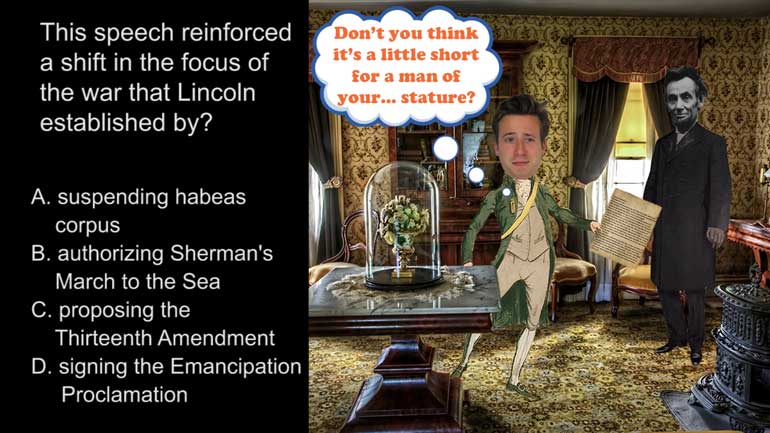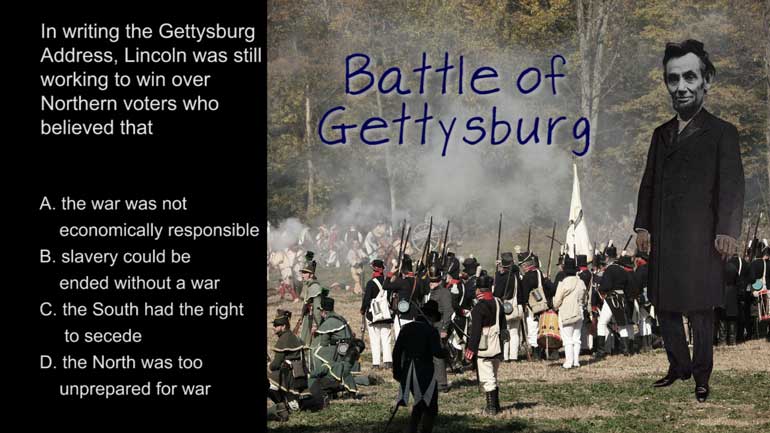ShmoopTube
Where Monty Python meets your 10th grade teacher.
Search Thousands of Shmoop Videos
Period 6: 1865-1898 Videos 11 videos
AP U.S. History 1.1 Period 6: 1865-1898. The sentiment expressed above was primarily a response to which of the following economic trends?
How did the wealthy justify their status and privilege? Other than the customary way of having large gold statues built in their likeness with sign...
AP U.S. History 1.3 Period 6: 1865-1898. Which of the following groups would be most likely to agree with the goals of the Populist Party?
AP U.S. History 2.4 Period 6: 1865-1898 209 Views
Share It!
Description:
AP U.S. History 2.4 Period 6: 1865-1898. During the 1880s, the United States began to develop a policy toward American Indians that...what?
Transcript
- 00:00
[ musical flourish ]
- 00:03
And here's your Shmoop du jour, brought to you by apathy,
- 00:07
the moment you stop caring about Facebook
- 00:09
and/or Instagram. [ sigh ] Yeah.
- 00:11
All right, check out this excerpt.
Full Transcript
- 00:13
Negroes were to become lessees of land...
- 00:16
[ mumbles ]
- 00:19
[ mumbling continues ]
- 00:22
Okay, and the question.
- 00:23
In general, Northerners responded to the
- 00:26
Black Codes described above...
- 00:28
how?
- 00:29
And here are your potential answers.
- 00:32
[ mumbles ]
- 00:34
[ mumbling continues ]
- 00:35
All right, what exactly were these Black Codes?
- 00:38
Well, if you look at the excerpt,
- 00:40
we see the author describes some
- 00:42
blatantly racist practices.
- 00:44
Blacks couldn't live anywhere except
- 00:47
towns and cities,
- 00:48
they had to make annual contracts
- 00:51
for their labor in writing,
- 00:53
and they had to present licenses whenever asked.
- 00:56
Even though the Civil War was over,
- 00:58
these Black Codes enforced legal discrimination
- 01:00
for years to come.
- 01:01
So let's see if we can figure out how Northerners
- 01:04
responded to these laws.
- 01:05
Well, in general, did Northerners respond to the Black Codes A -
- 01:09
first with ambivalence, but eventually with outrage?
- 01:13
Hmm. Well, Northerners had just spent four years fighting a
- 01:16
violent war with the explicit purpose
- 01:18
of ending slavery.
- 01:19
So they probably weren't gonna roll over
- 01:21
and accept these racist laws without a fight.
- 01:23
So we can nix A and D.
- 01:26
Could they have reacted
- 01:27
C - with endorsement for states' rights in the South?
- 01:31
Well, states' rights were another big issue during the Civil War,
- 01:34
so Northerners probably wouldn't have just said,
- 01:37
"Hey, the South can do what it wants.
- 01:39
Let's just leave them alone."
- 01:41
That eliminates C, too.
- 01:43
Which means that Northerners must have responded to the Black Codes
- 01:47
B - first with indignation, but eventually with apathy.
- 01:52
After the Civil War ended, Northerners
- 01:53
padded themselves on the back for a job well done,
- 01:56
because in their minds, slavery was over.
- 01:59
The issue had finally been resolved.
- 02:01
Well, not quite, pals.
- 02:02
After the war, the South passed these blatantly racist
- 02:05
policies, and even though so-called radical Republicans
- 02:09
actively campaigned against the Black Codes,
- 02:12
they ultimately failed in their efforts
- 02:14
to reconstruct the South in a fair way.
- 02:17
So the correct answer is B.
- 02:18
And looks like Southerners still had trouble with that pesky
- 02:22
"all men are created equal"
- 02:23
part of the Constitution. [ sigh ]
Related Videos
AP U.S. History Exam 2.45. The journey shown on the map was an example of...what?
AP U.S. History Exam 2.26. This speech reinforced a shift in the focus of the war that Lincoln established by...what?
What did the Spanish messengers bring with them to North America? Hint: you probably wouldn't be thrilled to get this for your next birthday.
AP U.S. History Diagnostic 24. How did the United States choose containment over the National Security Council Report in Latin America?
AP U.S. History Exam 2.25. In writing the Gettysburg Address, Lincoln was still working to win over Northern voters who believed that...what?
